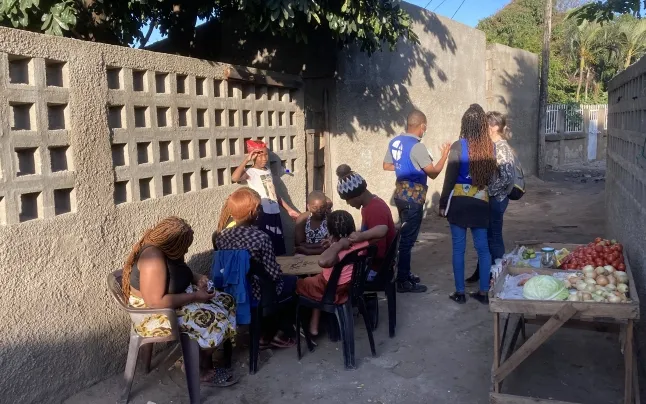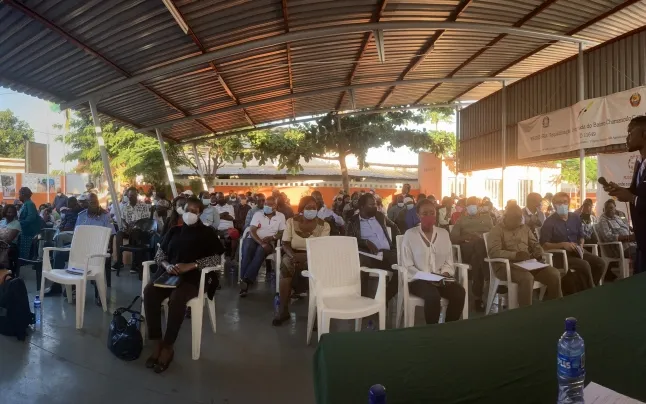Arquitectura Sense Fronteres celebrates thirty years of work in the defence of human rights through access to housing.
"Building rights for a dignified habitat" is the motto that Arquitectura Sense Fronteres (ASF) -Architecture Without Borders- has chosen to celebrate three decades of promoting human rights through universal access to decent housing to achieve social transformation. Since its foundation, in 1992 in Barcelona, the organization has carried out over four hundred projects in thirty-five countries.
With the right to housing as a fundamental principle of its actions, ASF places at the heart of all its interventions the communities where the organisation works, training and providing the necessary tools for them to take over the improvement of spaces and become agents of change. We have spoken to Sara Márquez, a member of ASF Catalonia and project coordinator in Mozambique.
What is the first reflection that suggests celebrating the 30 years of existence of Architecture Without Borders (ASF)?
Our organization is not static, it has evolved and made itself over time. And it is true that, in recent years, we have been thinking a lot about who we are and where we are going. An important reflection and a very big leap is that we have gone from thinking that what we do, even if it costs us our lives, is really the most important thing, to put at the centre not only our actions, but also our self-care.
In what way?
In knowing how far we can go, or accepting that maybe we can get a little less, but not disappearing as people. What I mean is to stop enslaving ourselves because we are very motivated by what we do. Currently we are living and experiencing this moment and I think it is a very beautiful reflection process.
And very valuable for the future.
Exactly. ASF, compared with other organisations, it is an association of highly motivated workers. For us, this is not just about our work; we really believe a great deal in what we are doing and we are aware of the changes that we are making. By this I do not mean that other organisations are unmotivated or fail to produce change, but it is true that the vast majority of organisations feed on workers who, in general, have worked with other organisations.
Doesn't that happen in ASF?
In our case, on the contrary, almost all our personnel works in ASF for a long time or we have only been in ASF. That is why we believe so much in what we do and think that it is legitimate that the strategy we have put forward focuses on our self-care. Because this great motivation we have is causing us to exploit ourselves. In this regard, I would say that we work more as a cooperative than as an NGO with salaried staff.
We are talking about the philosophy of cooperation that has guided the ASF's work.
We know that our commitment to the right to housing is very clear, but it is true that there is an intense internal debate on whether the right to housing or the right to the city should be at the heart of our actions. Neither of these concepts is covered as such in the Universal Declaration of Human Rights, but it is true that there is much more theory and the right to the city is more recognised.
What do we consider each one? What is the right to housing?
The right to housing is a holistic vision that puts people's lives and the environment at the centre. If we want to summarise it, it is a matter of living well, in a broad sense of the concept. Living in a healthy and calm environment that meets a number of working conditions, resources, with regard to the environment - it is a full life. And then, of course, there are more specific factors in which we go into the depths, such as having a place, a space.
Thus, this right focuses on the five basic principles of habitability, which are the durability of housing, access to water, sanitation, the right to tenure and not overcrowding. All in an environment that is beautiful, safe and emotionally calm.
And the right to the city?
It is a tricky concept in the sense that everyone thinks it is one thing, but it is actually much broader. It is a container of rights. In order to live in a human settlement, a person must have access to all human rights. The misconception lies in the word ‘city’, because people living in rural or periurban areas seem to be left out, but we speak of a city understood as a human settlement, whether in a city, in a rural area or anywhere on the planet.
How is it implemented?
The right to the city has a lot of academic work behind it and is very inclusive. It means that the physical space where you live, this human settlement, gives you access to all human rights. It is in this sense that our guiding vector is that the spaces we are building should guarantee human rights.
And we are not just talking about the result, but the very process of accompanying the development of a physical space is what is underpinning rights. By this I mean that if people self-build these spaces, then they know how to keep them and they become aware that the spaces are theirs.
It is about giving initiative to the people who live in this area.
Exactly, and the first dimension of the right in the city is that you have the right to change it according to your needs, as David Harvey says, one of our referents. This is an important turning point and has a strong impact on governance. I mean, you rule the city and you decide what your human settlement is like, not others. In this sense, he is totally opposed to attendanceism because you decide how your city will be governed, how your mobility will be, how your public spaces will be…
How do these spaces that you help build transform the reality of people?
We do this through the processes, which are really the ones that empower people. No one gives power to the people, it is they who must take that power. So one of the features we're looking for in spaces is that they're inclusive. However, we are also aware that total inclusiveness is unattainable. Unfortunately, you always leave people behind. So one of the strategies we use is to be aware of who we leave behind, that is to say, to become aware of the impact of all our actions, who are the injured and who is left behind.
How do you work this inclusion?
With participatory design, knowing who we can include in the participation phase, which is not so much what we think these people need, but starting to hear what they really want. And work with inclusive teams. If we look at the case of Mozambique, where we have worked hard to pass an urban law, we have managed to include women in this participatory phase, which is already a great leap in a country and context like this. And there are specific strategies to work inclusivity.
For example?
Well, when I said that we ask the community what he wants, we never ask everyone at the same time, but we do it by groups, separately. One of girls, one of boys, one of grandparents, grandmothers, adult men and adult women... In this way, it is at these separate meetings that what each group really wants comes out. It is not just the leader of the community or the people who have the most leading role, it is a more open process.
You haven't arrived here in a day, ASF has evolved over the years.
Development is constant, we are always learning from our mistakes, and every turn we take takes us a little further. We try to tie ourselves up as much as possible on academic currents and pass it on to practice, because it is clear to us that the important thing is to implement it on the ground. The academy lives without contradictions. Thanks to the praxis we get to reality, which is full of contradictions. These contradictions must be made visible and identified in order to improve each process.
And this is shown in how you plan the projects.
Yes, I think one of the biggest developments we've had is the fact that in the early years you could say we were doing projects that started and ended, and had a certain impact, but it was a rather short-term process. Instead, as time has passed, we have been consolidating lines of work and countries. So, instead of making atomised interventions in countries such as Mozambique, Senegal or Guatemala, we are working in the long term with the challenge of the projects being concatenated.
It makes more sense, but also it is more difficult.
Personally, I believe that a project that begins and ends in a year is not going anywhere. I mean, you can get a nice picture, but there can't be real social change. My experience in Maputo is that we start to see real development results after five years. We are talking about 700 families to whom we have really changed their lives, about real changes in terms of rights and dignity.
It is true, however, that working in the long term is more difficult, because those who give the money usually want immediate results and projects of 12, 24 or 36 months.
What task are you developing in Mozambique?
We are mainly in two cities, in Inhambane and in Maputo, the capital, and we are working mainly on the right to the city, understood in various dimensions, such as the right to housing, the right to tenure, the right to safe mobility with a gender perspective, the right to accessibility, among others. We also work hard on the right to live free from violence.
And you have achieved very important milestones.
One of the biggest has been passing a law, a job that has taken us five years. While we were intervening in a neighbourhood of Maputo, we realised that there was a ceiling for intervention because technically the law did not allow us to continue improving the neighbourhood. Then, we worked to have a political impact and we pushed through a participatory process that became an urban law, which has just been passed this year.
In this process, we have had the confidence of the community, the technical and municipal teams, the politicians ... By this I mean that it is not a guerrilla project, but an urban law that marks how this neighbourhood should be reclassified and that guarantees economic, social and environmental sustainability in the very long term. I think this is a milestone that says a lot about our evolution and our future as an entity.









Add new comment